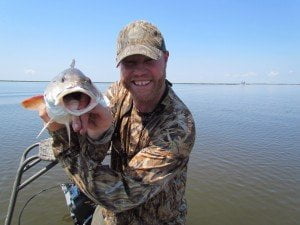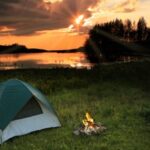Land Tawney, a fifth generation Montanan, learned his conservation ethics through his own experiences in the outdoors. Spending time in duck blinds in Montana’s Bitterroot Valley and catching trout in the Big Hole River fostered an appreciation for and understanding of the environment.
In 2004, Land brought that knowledge to the National Wildlife Federation when he became Regional Representative in Missoula, Mont. Land has worked on a number of efforts to improve conservation legislation in his state. Currently, Land is the Senior Manager for Sportsmen Leadership for the NWF. In this position, he works with hunting and fishing organizations on issues that directly affect them, such as wildlife funding and coastal Louisiana restoration.
Land, could you tell me why you got involved with the NWF?
I got involved with NWF eight years ago because it is the largest conservation organization in the country and I like our big tent philosophy. NWF is a place where hunters, anglers, hikers, birders and gardeners can all come together under the banner of conserving wildlife for future generations. NWF has a 76-year history of doing just that.
If you could be doing anything outside right now, what would it be and why?
Hmm, it’s not fall yet so duck hunting is out. I’d be on a small stream, maybe the East Fork of the Bitterroot River or the North Fork of the Blackfoot River, with my son or daughter on my back fishing for native Westslope Cutthroat trout.
 What is the purpose of Vanishing Paradise?
What is the purpose of Vanishing Paradise?
Vanishing Paradise was created to nationalize the issue of Mississippi River Delta restoration within the hunting and fishing community. For over 70 years the delta has been disappearing due to levees that cut off the fresh water and sediment of the Mississippi River to the wetlands, salt water intrusion and subsidence.
We are fast approaching a tipping point where we won’t be able to bring back this great national treasure. Today NWF leads a group of over 700 sportsmen based local, state and national organizations and businesses dedicated to restoring the Delta through educational and advocacy efforts.
The Mississippi Delta plays a huge role in the ecosystem of America. In a few sentences, can you sum up its importance for hunters, fishermen and the average citizen?
Coastal Louisiana winters over 11 million ducks and geese every year, that’s 70 percent of the waterfowl in the Mississippi River and Central Flyways. These wintering grounds ensure that ducks return to their breeding grounds in prime condition. As this Delta disappears, duck populations will suffer. So what happens in the marsh, matters to folks in Montana, North Dakota, Minnesota, Illinois, etc. The Delta also acts as the fish nursery for the Gulf of Mexico, providing rearing habitat for a host of fish species including redfish and speckled trout. The world class fishing and waterfowl hunting opportunities that go with the Delta—as it says on the Louisiana license plate—make this a true Sportsman’s Paradise.
 Most of our readers are casual hikers and campers who love that outdoors. How can they see the effects of the disappearing Delta?
Most of our readers are casual hikers and campers who love that outdoors. How can they see the effects of the disappearing Delta?
The Delta is a special place. In addition to fish and waterfowl, the delta is teaming with wildlife. There is no other place like it in North America, ranging from snowy egrets, herons, and roseate spoonbills to alligators and black bears. Over a third of our nation’s seafood comes from Coastal Louisiana. So if you like eating seafood, especially shrimp and oysters, you depend on the Delta.
In addition the marsh acts as a buffer from storms to New Orleans and other Louisiana communities. As we saw in Katrina, we need to replenish the marsh to save not only wildlife but people too. The unique Cajun culture is alive and well intertwined with the marsh, folks literally living off of what the wetlands provide, and as this paradise vanishes so does a culture.
What can the average outdoor lover do to help the situation?
Louisianans need help. They need conservationists from all across the country to realize what a great National Treasure the Delta is and what trouble it’s in. This means informing your friends, neighbors, and co-workers about the Delta. I have duck hunted all my life and knew ducks migrated south in the winter but had no idea about the Delta until I started working on this campaign three years ago. The next step is talking with elected officials and letting them know how important and issue this is and ask them to help.
This past summer the RESTORE Act was signed into law, which dedicates 80 percent of the Clean Water Act penalties associated with the BP oil spill back to gulf coast restoration. All of us need to let Congress know that we support restoration—and that we want to see this money used wisely, not squandered on unrelated or ineffective programs.
In short, spread the word and take action!




